Contents
Market Overview
Macro Review
The ECB’s tone surprised markets with its hawkishness, especially in the context of other major central banks that appear to be signaling that the end of their respective hiking cycles might be getting closer. In addition to a 50bps rate hike, the ECB also delivered a message pointing to a strong determination to continue hiking interest rates on the back of inflation forecasts that were revised higher, a willingness to remain in restrictive territory as long as necessary to tame inflationary pressures and the start of quantitative tightening. In reaction, risk-off sentiment prevailed, European sovereign bonds came under heavy selling pressure and the EUR/USD fluctuated around 1.06, as the USD appeal as a safe haven resurged amid increased risk aversion. This marked a reversal in sentiment that was boosted earlier in the week by U.S. CPI data surprising to the downside in November for a second consecutive month. This supported the view that inflation has likely peaked, and the Fed could slow the pace of rate hikes, despite Chair Powell’s relatively hawkish comments following the well telegraphed and expected 50bps hike by the FOMC on Wednesday. For its part, the Bank of England (BOE) said that inflation has likely peaked as it lifted interest rates to the highest level in fourteen years. In emerging markets, inflation continued to trend lower from high levels across CEE, adding a downside surprise in Romania to the ones seen the prior week in the Czech Rep and Hungary. The HUF outperformed as Brussels released EU funds to Budapest despite on and off tensions. The central banks in Mexico and Colombia hiked rates, in line with expectations. Oil rallied, supporting EM and U.S. HY outperformance.
EM Credit Update
Emerging market sovereign credit (cash bonds) ended the week +0.7% with spreads 4bps wider. Sovereign outperformers over the week were Ghana, Argentina and Ecuador, while Zambia, Vietnam and Suriname underperformed.
The Week Ahead
By the middle of next week, the FIFA World Cup will be a distant memory. Instead, EM interest rate decisions are due from Egypt (13.25%), Czech Republic (7.0%), Hungary (13.0%), Indonesia (5.25%) and Turkey (9.0%). For China, the December RRR cut leaves the door ajar for a near-term LPR cut (5-year LPR is 4.20%), which could be triggered by weaker data, such as the Manufacturing PMI. India will also publish its real GDP for FY22-23. For LATAM, the focus of next week rests with Argentina’s monetary data, along with inflation out of Brazil, Colombia, Mexico and Peru.
Highlights from emerging markets discussed below: Guilty verdict against Istanbul opposition Mayor adds further layers of political uncertainty ahead of 2023 elections in Turkey; Peru’s new President Boluarte appoints technocratic cabinet while political uncertainty persists amid unrest; and Ghana reaches staff-level agreement with the IMF on new $3bn program.
Fixed Income
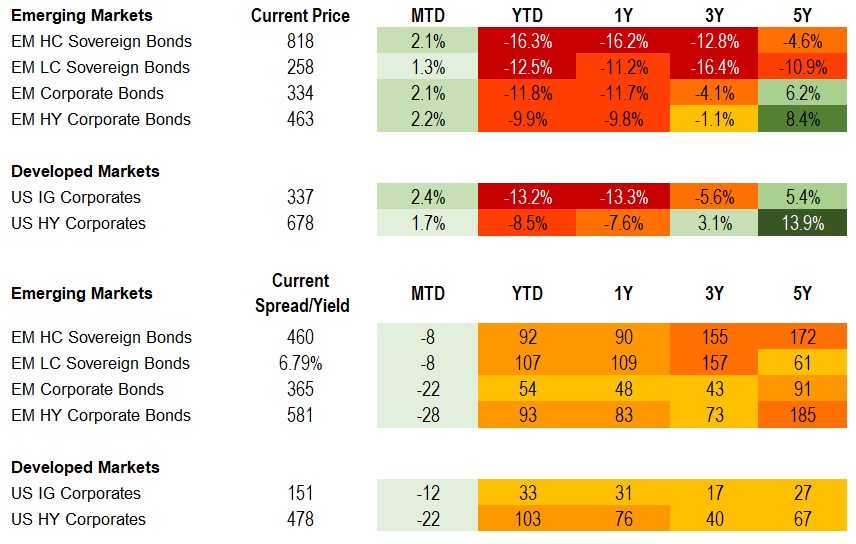
Equities
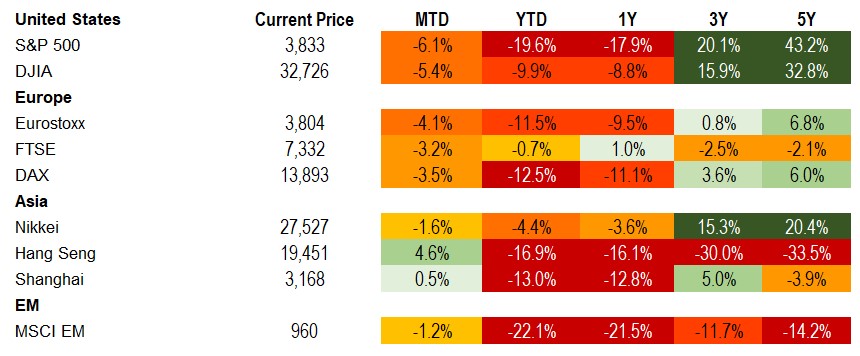
Commodities

Source for data tables: Bloomberg, JPMorgan, Gramercy. EM Fixed Income is represented by the following JPMorgan Indicies: EMBI Global, GBI-EM Global Diversified, CEMBI Broad Diversified and CEMBI Broad High Yield. DM Fixed Income is represented by the JPMorgan JULI Total Return Index and Domestic High Yield Index. Fixed Income, Equity and Commodity data is as of December 16, 2022 (mid-afternoon).
Emerging Markets Weekly Highlights
Guilty verdict against Istanbul opposition Mayor adds further layers of political uncertainty ahead of 2023 elections in Turkey
Event: This week, Ekrem Imamoglu, Istanbul’s Mayor from the main opposition party, CHP, was sentenced by a court to more than two years in prison for “insulting public officials”. Imamoglu can appeal the verdict in front of higher courts and will continue to serve as Mayor of Turkey’s most important city during the appeals process that will likely take at least several months.
Gramercy commentary: Legal proceedings against Imamoglu have been perceived by independent observers as politically motivated and an attempt to disqualify one of President Erdogan’s main potential challengers in the upcoming presidential elections due to take place by the end of June 2023. Now that a guilty verdict has materialized, it introduces additional risk scenarios into an already highly uncertain pre-election domestic political environment. The political dilemma in front of the six-party opposition alliance led by CHP, whose long-time leader Kemal Kilicdaroglu harbors strong ambitions to run against Erdogan, seems to have become even more significant. While deciding whether to put aside political egos and personal ambitions and nominate Imamoglu as a unity candidate to stand against Erdogan, opposition leaders face a major tradeoff. On one hand, given valid concerns about the lack of independence of Turkey’s judicial system, they will be running the risk that an unusually speedy appeals process could conclude before the elections and disqualify (in the case a guilty verdict gets confirmed) their main candidate. On the other hand, this could be a golden opportunity to galvanize increasing social discontent by those voters who see Imamoglu’s legal problems as a political sham designed to distract attention from Turkey’s acute macroeconomic imbalances and unprecedented cost of living increases under the current economic policies of the Erdogan Administration. Ahead of what we expect to be one of the most consequential elections in EM for years, opinion polls have consistently showed Imamoglu prevailing over Erdogan in a hypothetical 2nd round run-off election scenario. However, uncertainty surrounding the legal proceedings against the Istanbul Mayor and a combination of aggressive domestic economic stimulus and smart geopolitical maneuvering by Erdogan appear to have shifted the political momentum back in favor of the incumbent in recent months. In such a highly dynamic domestic political context, the outlook for Turkish market assets in 2023 remains clouded by increasingly dense uncertainty and hinges entirely on political developments next year.
Peru’s new President Boluarte appoints technocratic cabinet; political uncertainty persists amid unrest
Event: President Boluarte selected a largely market friendly cabinet to be led by lawyer, Pedro Angulo and put the Ministry of Economy and Finance under current and well-known Deputy Economy Minister, Alex Contreras. Boluarte announced that she intends to pull forward general elections to 2024 from 2026 in initial response to unrest in the aftermath of Castillo’s removal however, protests and calls for earlier elections continue.
Gramercy commentary: The persistence and broadening nature of the unrest points to an increased probability for Boluarte’s resignation which would trigger fresh elections to be held in 2023. In this scenario, we see greater volatility for Peruvian assets next year as there is high uncertainty associated with the likely emergence of unknown or controversial candidates. In contrast, if the protests subside, Congress approves Boluarte’s cabinet, and elections are officially moved to 2024, we would expect a period of reprieve from political noise albeit still subpar governability.
Ghana reaches staff-level agreement with the IMF on new $3bn program
Event: Following the conclusion of the IMF’s latest two-week mission to Accra, the Fund announced it had reached an agreement with Ghanaian authorities on a three year $3bn Extended Credit Facility (ECF). The press release commended Ghana for committing to a broad based macroeconomic and structural reform agenda and initiatives to restore debt sustainability. Board approval will be contingent upon further progress on domestic and external debt negotiations. The Ghanaian cedi has appreciated significantly on the news retracing much of the losses since late summer.
Gramercy commentary: We see the agreement as constructive with a solid size, comparatively swift timing, and supportive Fund comments on the fiscal approach, which entails a mix of resource mobilization and expenditure management, suggesting that the IMF is broadly aligned with the authorities’ 2023 budget. Our base case remains for 1Q board approval as domestic and external debt resolutions gather steam. We anticipate details of initial proposals on external debt in the coming weeks or first weeks of the new year. In the interim, the solid momentum of events including the domestic debt restructuring proposal, formation of external debt committees, proposed 2023 budget, and a staff-level IMF agreement has begun to catalyze a virtuous shock as reflected with the ample Ghanaian cedi appreciation. While there is still room for volatility on both domestic and external debt negotiations as well as politics, our base case envisions an ultimate recovery comfortably above current prices well-anchored by multilateral and policy support.
Emerging Markets Technicals
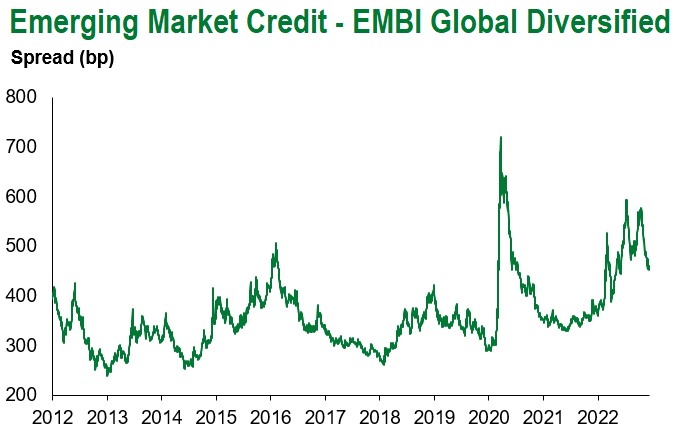
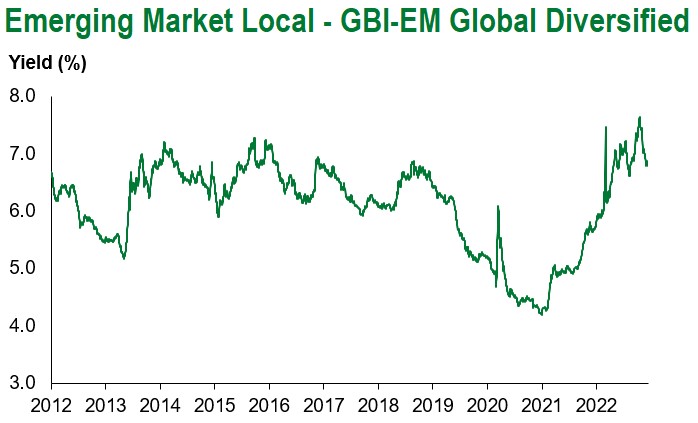
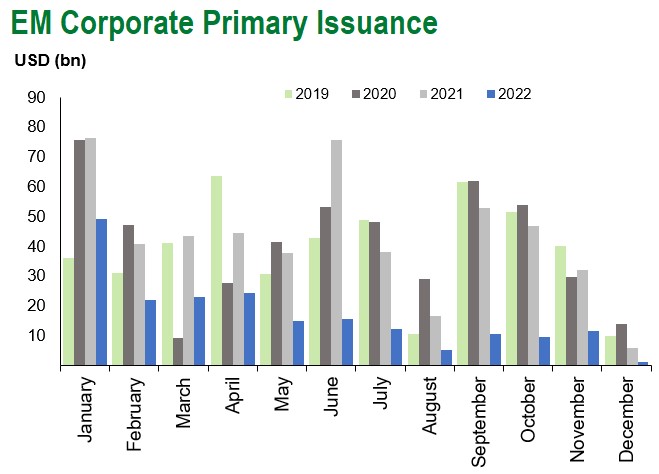
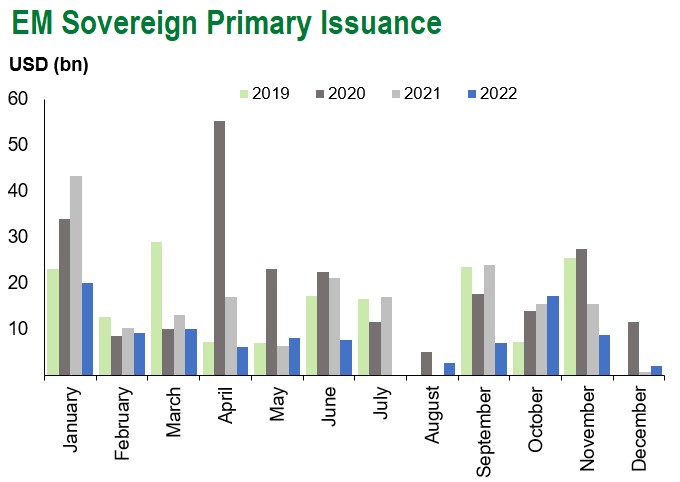
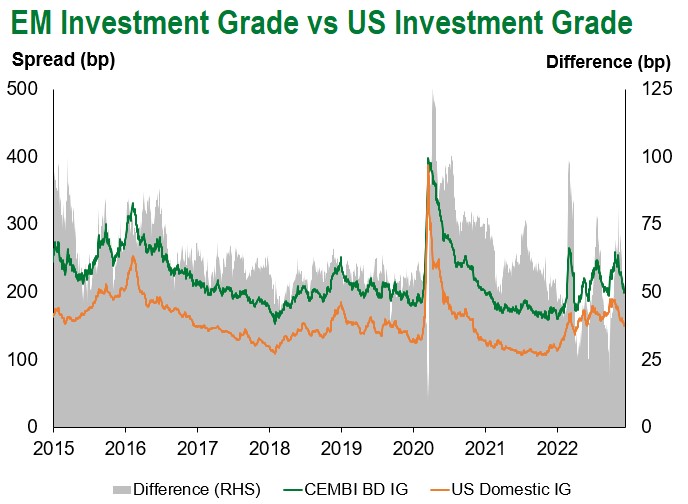
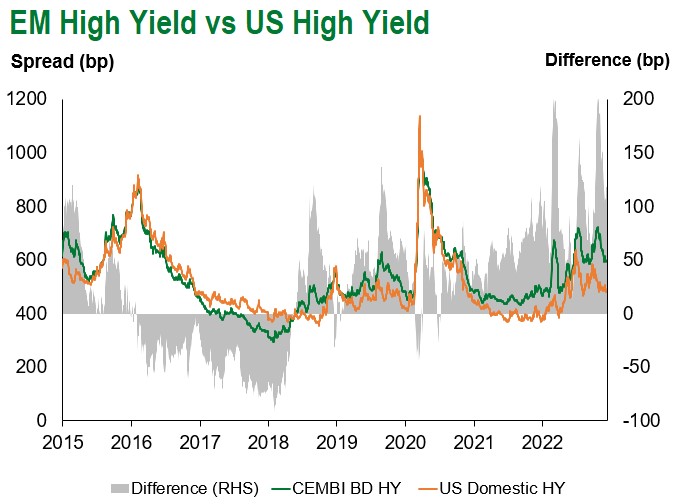
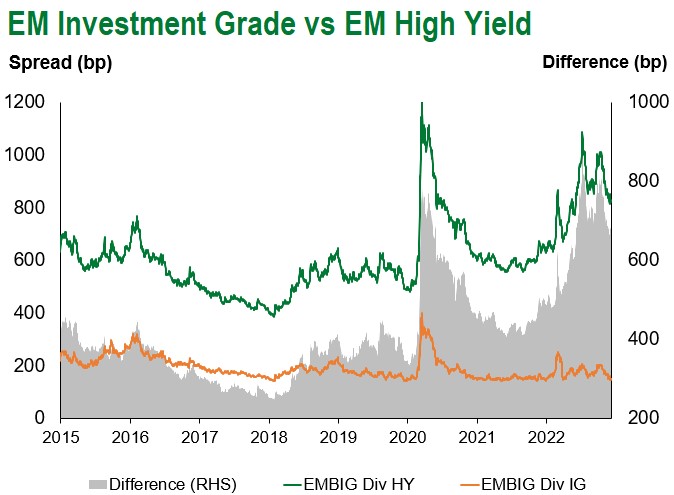
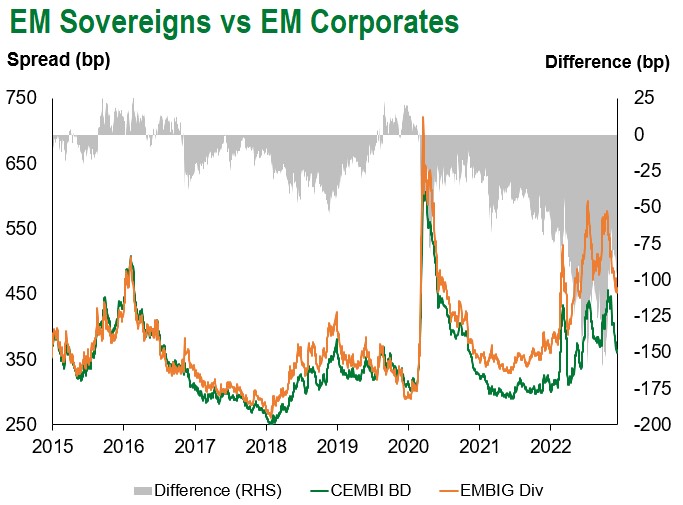
Emerging Markets Flows
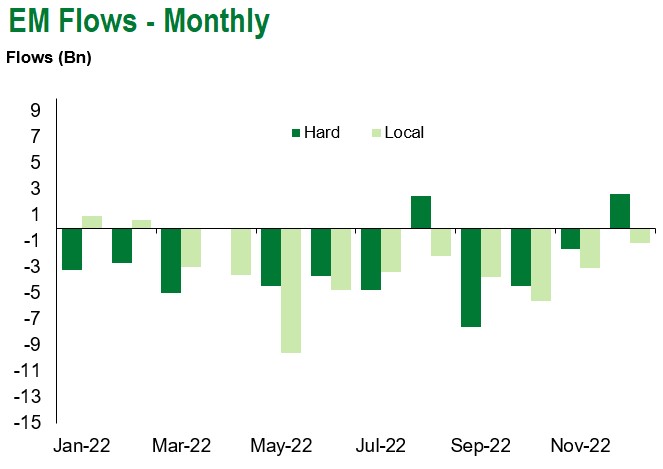
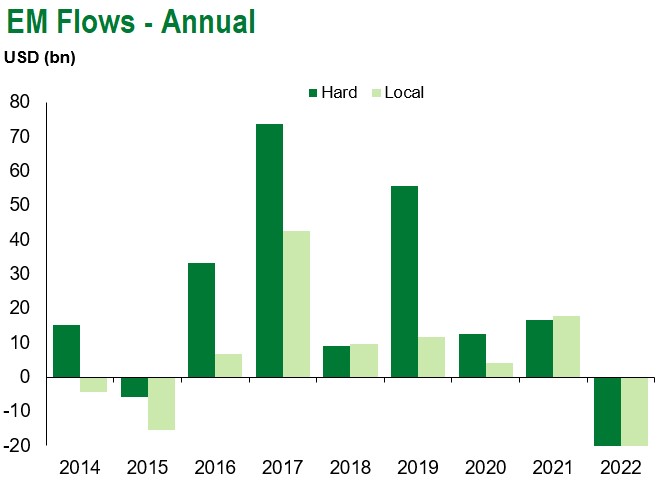
Source for graphs: Bloomberg, JPMorgan, Gramercy. As of December 16, 2022.
COVID Resources:
Johns Hopkins COVID-19 Case Tracker
For questions, please contact:
Kathryn Exum, CFA ESG, Director, Co-Head of Sovereign Research, [email protected]
Petar Atanasov, Director, Co-Head of Sovereign Research, [email protected]
James Barry, Director, Deputy Portfolio Manager, [email protected]
This document is for informational purposes only. The information presented is not intended to be relied upon as a forecast, research or investment advice, and is not a recommendation, offer or solicitation to buy or sell any securities or to adopt any investment strategy. Gramercy may have current investment positions in the securities or sovereigns mentioned above. The information and opinions contained in this paper are as of the date of initial publication, derived from proprietary and nonproprietary sources deemed by Gramercy to be reliable, are not necessarily all-inclusive and are not guaranteed as to accuracy. This paper may contain “forward-looking” information that is not purely historical in nature. Such information may include, among other things, projections and forecasts. There is no guarantee that any forecasts made will come to pass. Reliance upon information in this paper is at the sole discretion of the reader. You should not rely on this presentation as the basis upon which to make an investment decision. Investment involves risk. There can be no assurance that investment objectives will be achieved. Investors must be prepared to bear the risk of a total loss of their investment. These risks are often heightened for investments in emerging/developing markets or smaller capital markets. International investing involves risks, including risks related to foreign currency, limited liquidity, less government regulation, and the possibility of substantial volatility due to adverse political, economic or other developments. References to any indices are for informational and general comparative purposes only. The performance data of various indices mentioned in this update are updated and released on a periodic basis before finalization. The performance data of various indices presented herein was current as of the date of the presentation. Please refer to data returns of the separate indices if you desire additional or updated information. Indices are unmanaged, and their performance results do not reflect the impact of fees, expenses, or taxes that may be incurred through an investment with Gramercy. Returns for indices assume dividend reinvestment. An investment cannot be made directly in an index. Accordingly, comparing results shown to those of such indices may be of limited use. The information provided herein is neither tax nor legal advice. Investors should speak to their tax professional for specific information regarding their tax situation.
